Political Abolitionism
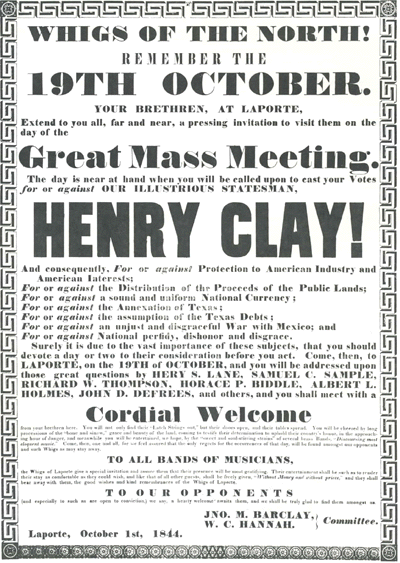
Courtesy Indiana Division, Indiana State Library
The Age of Jackson marked the expansion of political democracy and the growth of a nationally organized two-party system. During these years several independent parties also emerged, some of them principally concerned with the growing sectional controversy. Abolitionism, and abolitionists, increasingly became involved in the political arena.
By the mid-1830s some members of the American Anti-Slavery Society began to seek alternatives to moral suasion alone--but met resistance in their own group. Garrisonians did not view political action as a means to achieve their goals, yet both factions agreed that no true abolitionist could vote for any candidate who supported the slavery side of the argument. William Lloyd Garrison maintained that rather than vote for a neutral or pro slavery candidate, abolitionists should not vote at all. His opponents maintained that only by political action could they achieve their goals. This point became one impetus for a split among the members.
In 1838, abolitionist William Goodell published a series of articles calling for political action against slavery. "The time has now fully come," Goodell asserted, "when the friends of liberty . . . should prepare themselves to put forth . . . political action against oppression." Goodell quoted The Emancipator to the effect that abolitionists could not, "with a good conscience, assist in placing men in office, who-they know will act against the greatest interest of the country." Moreover, according to Goodell, no believer in abolitionism could employ men who would use "their official power and influence in strengthening and defending [the] country's most malignant and dangerous enemy--slavery.''1
In 1839 Garrisonians gained control of the executive offices of the American Anti-Slavery Society. During the same year Lewis Tappan, a wealthy New York abolitionist, formed the American and Foreign Anti-Slavery Society. This more politically oriented group asserted that political action was needed to overcome constitutional and legal obstructions to emancipation. Myron Holley, an abolitionist from upstate New York, urged others to organize a political party, and, in November, 1839, a convention met at Warsaw, New York, for this purpose.
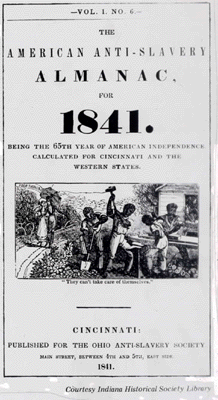
Courtesy Indiana Historical Society Library
The Liberty party was organized for the sole purpose of defeating slavery in America. It sought the votes of northern conservatives by attempting to show that the continued existence of slavery and the slaveholders' domination of the government threatened everyone's economic, political, and religious interests. Hence, the party "provided a way of not voting for the parties which sinfully governed.''2 The party nominated James G. Birney, an ex-slave- holder and ex-member of the Alabama and Kentucky legislatures turned devout abolitionist, and Francis Julius LeMoyne for president and vice- president in 1840. Birney originally declined the nomination; he wanted to wait and see who the Democrats and Whigs would nominate. After the Democrats nominated Martin Van Buren and the Whigs selected William Henry Harrison, the Liberty party held a convention in Albany, New York, and renominated Birney for president with Thomas Earle as his running mate. So repulsive were the Democratic and Whig nominations that Birney now accepted. The time had not yet come, however, for the ideas the Liberty party espoused; in the 1840 election it garnered only 7,000 votes.
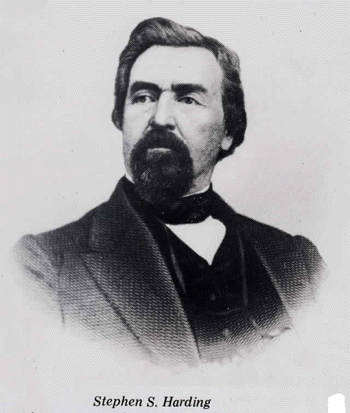
Engraving courtesy Adena Charlton
In September, 1842, the Liberty party's state convention nominated Elizur Deming for governor and Stephen S. Harding for lieutenant governor. The party's election returns, however, comprised only approximately 1 per cent of the statewide vote. By 1852, the Liberty party had faltered in both the state and nation.3
In Indiana, the Henry County Female Anti-Slavery Society was by far the most overtly political female organization in the state. These women, though they could not vote themselves, decided to be the power behind the ballot by influencing their husbands, fathers, and brothers. The Society stressed that Indiana's General Assembly had enacted various laws which had the tendency "to increase and strengthen . . . prejudice" and resolved to persuade their male relatives to use their voting privileges to elect men "who will remove these evils by the introduction of righteous and just laws."4
In early November, 1841, the Society appointed a committee to prepare a memorial to Congress asking that it use all its power to abolish slavery and to procure signatures of females friendly to the cause. The Society forwarded the petition to John Quincy Adams, to whom the women believed the nation owed its gratitude "for his increasing efforts in favor of the Constitution and the right of petition." This committee also prepared a petition for the state legislature, asking for repeal of the 1831 law requiring black emigrants to post bond and security for their good behavior and maintenance. Signatures were acquired, and the petition forwarded to Henry County Representative Robert M. Cooper. 5
In the early 1840s the proposed annexation of Texas (then an independent republic) became a major issue in national politics. Abolitionists and antislavery advocates throughout the nation railed against annexation, fearing the extension of slavery into the Southwest. Once again the Henry County Female Anti-Slavery Society exercised its right of petition. "We believe," the women wrote, "the annexation of Texas into this Union is calculated to strengthen and perpetuate the system of slavery and will tend to build up the aristocracy of the south and break down the free states of the North." Protesting the action of "Female Whigs" who were not sufficiently antislavery, the Henry County women expressed their point of view poetically:6
Let woman then exert her powers
To bless this erring land of ours
To bring about that glorious day
When peace her sceptor bright shall sway,
O'er every mountain, hill or plain
Nor slave nor master shall remain
But all mankind shall brethren be
And each exult in liberty.
William G. Ewing of Fort Wayne also expressed his concern over the disposition of Texas to Congressman, Andrew Kennedy in Washington, D.C. Texas, he asserted, with "a mild climate and fine soil can form a host of new states, if the south gets this," said Ewing, "as it is to be feared it will with the curse of slavery, the southern and slave holding Interest will preponderate in the councils of the Nation.''7
Western party men saw the need to broaden their position. Salmon P. Chase, a Liberty party member from Ohio, led the call for a modification in the Birney faction's program. Chase contended that immediate abolition was not the only issue the party should stand for. Subsequently he and his followers founded the National Anti-Slavery Society, which contended that the party could only constitutionally lobby for the abolition of slavery in the District of Columbia and the territories. In June, 1845, Chase and his followers held a convention in Cincinnati and formed a coalition. Most major party journals, including the Indiana Free Labor Advocate, supported the coalitionists, who hoped to win the support of antislavery members of the major parties.8
Despite northern and abolitionist antipathy toward annexation, Texas was admitted to the Union as a slave state in 1845. The Texas issue precipitated a crisis between Mexico and the United States and resulted in the Mexican War of 1846-1848. Mexico's defeat, and the subsequent Treaty of Guadalupe Hidalgo, opened a huge area for potential American settlement. Even during the treaty negotiations the North-South battle over territorial expansion, and the status of slavery in such territory, continued. The subject became an issue in the presidential campaign of 1848, and Hoosiers paid close attention to the sides their candidates took.
By the late 1840s, with the continuing strife over the extension of slavery, political parties further divided, and new ones formed. In the past, one source commented, political parties developed by "divisions of affinity," but now divisions resulted along geographical lines. "There is," the colonizationist B. T. Kavanaugh wrote in 1847, "a new and fearful effort being made to depart from the conservative and healthy course of policy, and to produce divisions based upon Geographical lines!" This effort "to array one portion of the country against another, and to indulge a vituperative and vindictive spirit . . . threatens to arouse the angry feelings on both sides of the line." He blamed both the abolitionists and pro slavery sympathizers for the impending crisis: "The foundation of this movement is, professedly, in a hatred to slavery among a portion of the citizens of the North, growing out of Abolitionism, and a restless pro-slavery spirit of a few of the citizens of the South." Kavanaugh insisted that colonization was the only alternative to avoid disunion.9
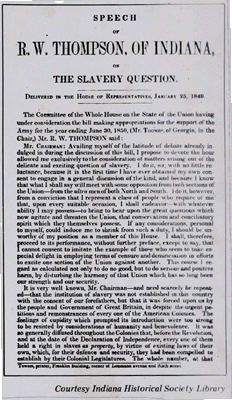
Courtesy Indiana Historical Society Library
Stress over the dispensation of the Mexican Cession also strained relations in the Democratic party. David Wilmot, a Democrat from Pennsylvania, proposed a solution to the slavery extension issue in 1846. The Wilmot Proviso, as it was called, argued that the newly acquired territory should be kept free of slavery. Some Hoosiers supported the Wilmot Proviso and formed the Indiana Wilmot Proviso League.10 That organization disbanded, however, after Congress rejected the measure. The Wilmot Proviso later acted as an impetus for the formation of a new political party, the Free-Soil party. Schuyler Colfax, editor of the South Bend St. Joseph Valley Register and a future congressman, was one Hoosier who supported the measure and encouraged others to do likewise.11
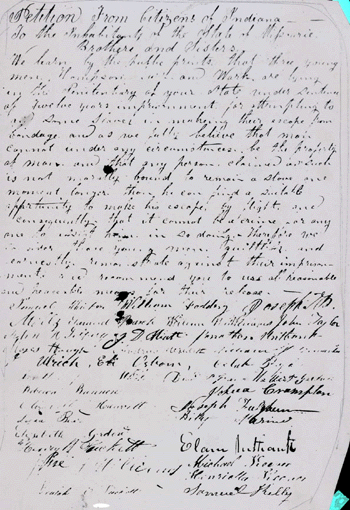
Petition from Citizens of Indiana to Inhabitants of the State of Missourie
Courtesy Indiana Historical Society Library
Transcription
Petition From Citizens of Indiana ----
To the Inhabitants of the State of Missourie.
Brothers and Sisters,
We learn by the public prints that three young men Thompson, Burr and Wark are lying in the Penitentiary of your state under sentence of twelve years imprisonment for attempting to aid some slaves in making their escape from bondage and as we fully believe that man cannot under any circumstances be the property of man and that any person claims as such is not morally bound to remain a slave one moment longer than he can find a suitable opportunity to make his escape by flight and consequently that it cannot be a crime for any one to assist him in so doing – Therefore we consider those young men guiltless and earnestly remonstrate against their imprisonment and recommend you to use all reasonable and peaceable means for their release –
[Names very difficult to transcribe]
Samuel _____, William Fadd___, Joseph ________, _______ _________, William Williams, John Taylor, John ______, J. D Piatt, Jonathan _________, Moses Haugh, ____ ______, Ulrich, Eli Osborn, ____ _____, ……………….
Rebecca Bannon, Elizabeth _______, Lyra Bear, Elizabeth Gordon, ______ __ckett, ____ _________, ______ ______, Jo___ Crampton, Joseph _______, _____ Marnie, Elam ___tianti, Michael Keever, Henrietta Keever, Samuel Kelly
The Free-Soil party, organized in 1848, manifested a quasi-antislavery platform. The party, however, offered no sound threat to slaveholders’ "property rights." Free-Soilers adopted Wilmot's proposal and thereby safely opposed slavery extension while they remained uncommitted to black equality. They opposed slavery extension into new territory, but supported the contention that slavery should remain in areas where it already existed. Whites, especially in the free states and the new territories, feared economic competition from blacks; it was not unusual for both free and enslaved blacks in the South to hold skilled positions.
Though the Free-Soil party did not manifest true abolitionism, both abolitionist and antislavery supporters saw the advantage of banding together to support the party. As the movement gained momentum in various Indiana counties, supporters felt more politically competent and confident. No longer satisfied with being on the defensive, they became more aggressive. "We are holding mass meetings & getting ourselves a little warmer than we have ever been before," Henry Charles asserted. "I am not now satisfied with acting only on the defensive, but attack every old hunker. I must and I can do it with an energy & a boldness which I never so fully realized before.''12 In 1852 the Free-Soil party nominated George Julian, a Wayne County antislavery advocate, for the vice-presidency of the United States.
Political abolitionists claimed that Congress had the authority to regulate federal territory. Schuyler Colfax, though not an abolitionist, favored the Wilmot Proviso and recommended that others do likewise. Although, according to Colfax, Congress had complete authority to regulate policy in the territories, he believed "it would be an imminent hazard to the Union" if the nation divided--North versus South--over the issue of the proviso.13
Congress, in an attempt to defuse the explosive issue, passed several laws known, collectively, as the Compromise of 1850. The provisions included: (1) admission of California as a free state; (2) the organization of other territories without mention of slavery; (3) a new Fugitive Slave Law; and (4) prohibition of the slave trade in the District of Columbia. Abolitionists, in Indiana as elsewhere, were outraged by the Compromise of 1850--especially the revised Fugitive Slave Law--and believed that the North had "sold out" to the South. At the other end of the spectrum, pro slavery advocates were soon clamoring once again for popular sovereignty and states' rights.
Slavery dominated the national policy of the next decade. As the dichotomy between the sides grew ever more grievous, men like Andrew Jackson Harlan, an Indiana congressman from Grant County, could write a friend of like temperament in the nation's capital: "We have much feeling here on the subject of Slavery & the Union & Disolution [sic] of the Union. How things will eventually terminate I know not--for the Union I hope.''14
Four years after the 1850 Compromise, national tensions over the slavery extension issue reached a new high. The Kansas-Nebraska Bill aggravated the struggle over states' rights versus the central government. The bill repealed the Missouri Compromise, which banned slavery north of the 36-30 line, and extended the principle of popular sovereignty to Kansas and Nebraska. Stephen Douglas, senator from Illinois, sponsored the bill and directed its passage through Congress. Though Kansas was not admitted to the Union until 1861, this issue precipitated southern aggression leading toward the Civil War.
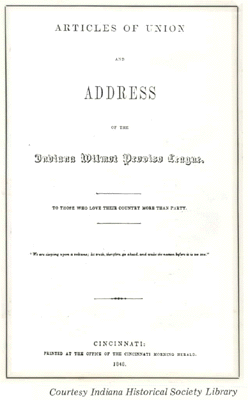
Courtesy Indiana Historical Society Library
The issue had divisive effects on Hoosier Democratic politics. For example, Jesse Bright, one of Indiana's senators, wrote Congressman William English that he regretted that he and English did not see eye to eye on the subject. "I am sorry," Bright lamented, "I could not have met you as promised in order to compare notes about Kansas. . . . It is to be regretted that you & I could not have harmonized on this question. I hope, sincerely hope, we yet will be able to do so." l 5
Jacob P. Dunn, a Lawrenceburg merchant, supported states' rights and popular sovereignty: "The people of the Territories must settle their domistic [sic] institutions without any outside influence in their own way with no trammels but such as the Constitution imposes. This old fashioned federalism that is not willing to trust the people wont do in our day.''16
Horatio J. Harris, a former Indiana state legislator and state auditor who moved to Mississippi in 1847, expressed his concern to Governor Joseph Wright over the effects of abolitionists in Indiana regarding the Nebraska issue. But he voiced his confidence that, ultimately, the state's Democratic party would prove loyal to the states' rights side as a matter of principle. "I trust," he wrote Wright, "the democracy of Indiana will not be led astray, by the side-issues which the Whigs and abolitionists are trying to force into your next election, and that another glorious triumph will indicate their devotion to principle.''17
Wright supported the Nebraska faction of the controversy, believing that the Nebraska issue was one of states' rights against centralization and that "the Whigs believe a few men at Washington City should act & govern the people.''18 This position did not satisfy more politically astute observers. "No one," wrote John Hunt from Cambridge City, "would ask you to sacrifice principle for office." He felt it was a matter of expediency, not principle. "The matter in controversy," he told Wright, "may be summed up in a few words. The friends of the Nebraska Bill go for the extension of Slavery [and] against religion and temperance (not from Principle but from interest, politically). The Anti-Nebraska Party go [sic] against slavery everywhere it can be done without interfering in States where it now exists." "It is time," Hunt admonished Wright, "you 'showed your hand' to the world . . . if you decide in favor of Nebraska you are politically damned. . . . The people of the State will not sustain Slavery, Drunkenness, & infidelity.”19
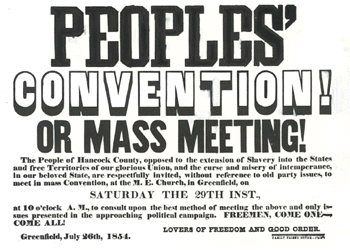
Courtesy Indiana Division, Indiana State Library
The Kansas-Nebraska controversy increased the ranks of those opposed to slavery extension; after the bill's passage, many Whigs and some Democrats joined the antislavery bandwagon. Schuyler Colfax, a shrewd politician, decided to oppose the bill openly and called for " 'An Union of Freemen For the Sake of Freedom.' ”20 Subsequently, Indiana opponents of the Nebraska bill denounced the repeal of the Missouri Compromise and formed the People's party, which evolved into the state Republican party. Composed of antislavery Whigs, anti-slavery Democrats, and Free-Soilers, the party called for repeal of the Fugitive Slave Law and the Kansas-Nebraska Act and the restriction of slavery to the states where it already existed. Republicans nominated John C. Fremont as their presidential candidate in 1856, to oppose Democrat James Buchanan, who was elected.
During Buchanan's presidency, the United States Supreme Court rendered a decision which further agitated the slavery controversy. Dred Scott, a slave of a Missouri slaveholder, claimed that he was free because he once had resided in free territory. His court battle, which spanned eleven years, went through several state courts and was finally decided by the Supreme Court in 1857. Chief Justice Roger B. Taney, a slaveholder from Maryland, read the judicial decision; by a vote of seven to two the Court found that blacks were not citizens of the United States. Taney further pronounced that blacks had no rights that whites were bound to respect. The Court also declared that the Missouri Compromise was unconstitutional and that Congress had no power to regulate slavery in the territories. 21
The Dred Scott decision was a defeat for abolitionists, who now placed their hopes on the Republican party even though it did not completely incorporate their goals. By the late 1850s, however, the Republican party's advocacy of free soil principles further threatened the peace and security of the Union. It was not the cure for the problems incurred since the Compromise of 1850. "I intend to be perfectly frank in what I say," Corydon resident Thomas C. Slaughter wrote Daniel Pratt; "I dislike very much 'an organization resting on a sectional basis.' . . . Here lies the danger in the republican movement of the North. Though I have been a determined opponent of slavery extension, and feel that every sentiment common to the people of the North has been outraged by the repeal of the Missouri prohibition, and more recently by the outrages in Kansas, yet I do not recognize the necessity of abandoning all other questions and going to battle on a single idea, the two that brings the North and the South in direct and open antagonism with each other, leaving no common ground for the two sections to stand on." He then predicted that if the North and the South had an open conflict over the slavery question no one would emerge the victor. "Let the North and South," Slaughter warned, "once face each other on this naked question, and I care not what men say, there is danger to the Union." He continued, "I do not ask any man to stand on the slavery platform . . . but I do insist that we should not abandon the American idea. . . . It is true I hate compromises . . . but I do love this Union even more than I hate slavery.''22
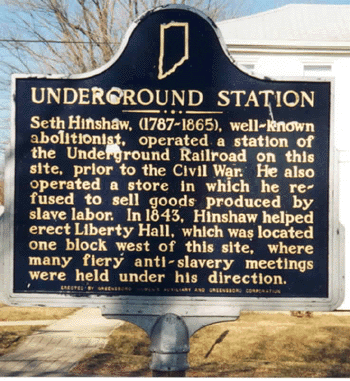
Historical marker in Henry County
SE corner Main Street & Greensboro Pike, Greensboro.
